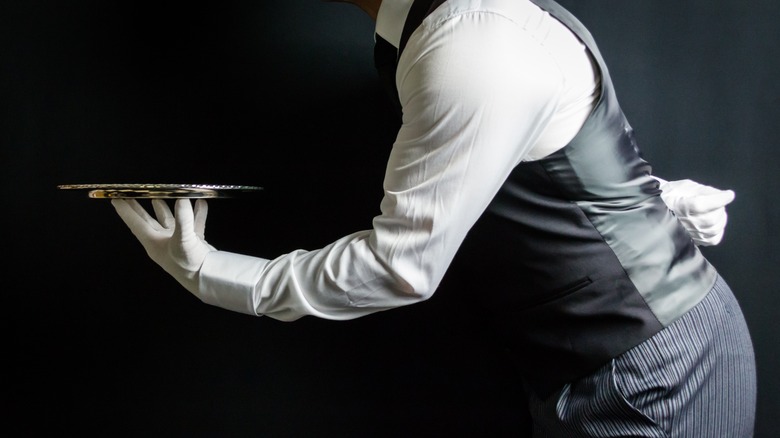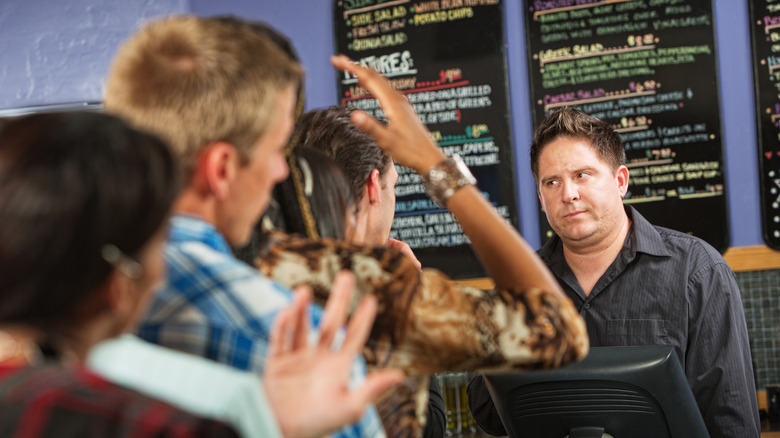Working In The Restaurant Industry Feels Like Begging For Money From Strangers
At first glance, a small-town diner and an opulent steakhouse are polar opposites. What could a sleek, high-ceilinged restaurant serving molecular gastronomy appetizers have in common with a strip mall breakfast joint specializing in triple-stacked pancake combos? Perhaps they both lack accessible parking or boast a long-forgotten table with gum at its underbelly. Luxurious or not, there's one common denominator that exists among all restaurants: hard-working employees.
It doesn't matter if you're slinging onion burgers or Wagyu beef; working at a restaurant requires an unshakable work ethic, strong emotional will, and staunch people-pleasing skills. Whether you're 16 or 60, navigating the industry is difficult. But it's not just the long hours, sore feet, and stale smells that inevitably stick to your favorite pair of pants. It's also the pay.
In the United States, working in the restaurant industry means you, and you alone, determine your salary. Sure, it's customary to leave a 20% tip on a restaurant bill, but it's bold to assume that servers and bartenders are actually thriving off of the generosity of strangers. Any industry veteran can tell you that earning a worthwhile tip is physically and mentally taxing. And even when you do everything right, there's always a chance the tip will fall short of fair.
Servers and bartenders are often only paid enough to cover taxes
In many countries outside of the U.S., tips aren't expected for service. If you pop into a French bistro for coffee and scones, you simply pay your bill and leave. That's because many countries are required by law to pay servers and bartenders a livable wage. In America, however, restaurants can pay their tipped employees as low as $2.13 — only enough to cover taxes. New York state offers tipped service industry employees the highest rate in the nation at only $10 an hour, which is still not exactly a livable wage. Across the rest of the U.S., 36 states pay their tipped employees under $5, and 19 of those states offer only the bare minimum at a whopping $2.13.
A non-service industry worker would posit one solution: Work harder for better tips. Sure, that's true to some extent. The kinder and quicker you are, the more likely you are to receive a valuable tip. But someone who's never waited tables probably isn't familiar with side work.
In the restaurant industry, side work refers to the duties you're required to complete before clocking out. Side work typically includes rolling silverware, refreshing the ice station, and re-stocking glasses. Sounds easy, right? While it's generally painless labor, no one's tipping a server for polishing silverware or replacing the Dr. Pepper syrup on the soda fountain. That means that many servers in America are making under $3 an hour to maintain the organization and flow of a restaurant.
Difficult customers make earning valuable tips harder
Despite being paid an utterly offensive wage, servers and bartenders are forced to persist. How else will they survive? The best option is to slap some imaginary tape at the edges of their mouth for a smile convincing enough to appear gleeful while offering their 30th table of the day another iced tea refill. Otherwise, the angry mom with an apathetic husband and unruly kids will threaten their livelihood with a stiff tip.
The U.S. is said to be the most generous nation in the world when it comes to tipping. But that's not because everyone who walks into a restaurant is jumping at the opportunity to leave an Instagram-worthy tip; it's more likely that tipping is simply hard-wired into American social standards. In recent years, though, "Karens" have been a hot topic on social media, and their behavior provides ample evidence that not all Americans are generous with their tips.
Unfortunately for servers and bartenders, Karens aren't just memes. They're real people who have real bad attitudes. Regardless of their age or appearance, customers in restaurants can be entitled, arrogant, and downright hateful. When you work in the service industry, you become unwittingly familiar with people's egotism. They no longer see you as humans — only a commodity that they can control and command. Having a bad day at work? Bite your tongue or risk losing dinner money because the Karen at table 13 thinks a 10-minute wait is enough to rob a server of their paycheck.
Treat your server with kindness and gratuity
In order to improve the labor conditions for servers in the United States, it's critical that they're treated with respect. Every day, service industry professionals provide memorable experiences to the millions of Americans who dine at restaurants. Servers offer us a brief escape from reality, setting us up to enjoy meaningful moments in time that bring us closer to our families, friends, and the foods we love most.
From first dates to graduation dinners, it's high time that service industry professionals are formally honored as champions of the little moments in life that make us who we are. It starts with a call to action. It's inexcusable that servers across the nation are being paid under $3 an hour. Restaurants need to provide monetary equity on slow business days and ensure that duties even as trivial as polishing silverware are accounted for on each and every paycheck.
Many servers already feel like beggars, trapped by the invisible tape that holds their smiles together and unable to stand up for themselves without risking their rent payment. They're working through bad days and hard times to serve you hand and foot, so, please, show some grace and tip your server a fair wage.



